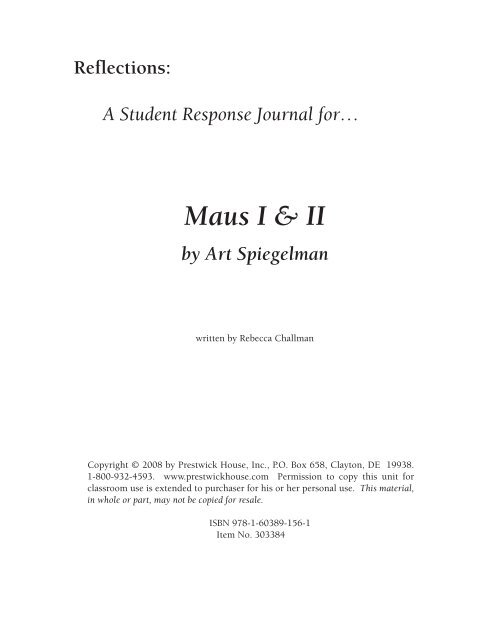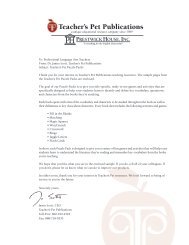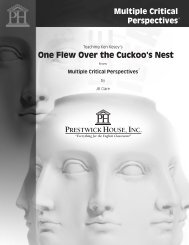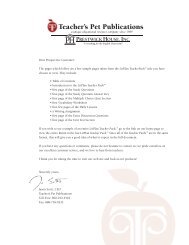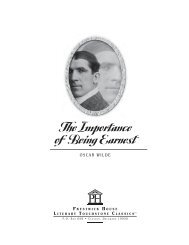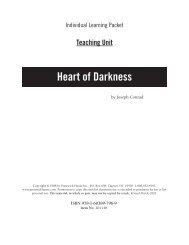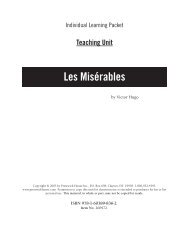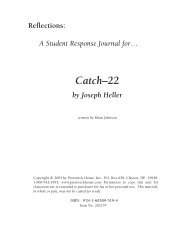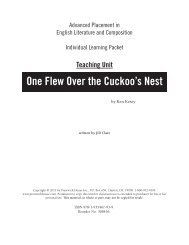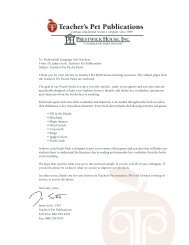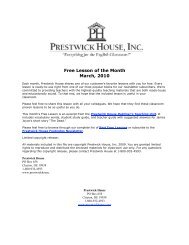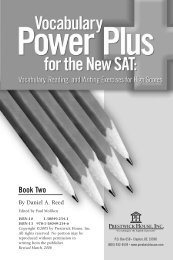Maus I & II - Response Journal Sample PDF - Prestwick House
Maus I & II - Response Journal Sample PDF - Prestwick House
Maus I & II - Response Journal Sample PDF - Prestwick House
You also want an ePaper? Increase the reach of your titles
YUMPU automatically turns print PDFs into web optimized ePapers that Google loves.
Reflections:<br />
A Student <strong>Response</strong> <strong>Journal</strong> for…<br />
<strong>Maus</strong> I & <strong>II</strong><br />
by Art Spiegelman<br />
written by Rebecca Challman<br />
Copyright © 2008 by <strong>Prestwick</strong> <strong>House</strong>, Inc., P.O. Box 658, Clayton, DE 19938.<br />
1-800-932-4593. www.prestwickhouse.com Permission to copy this unit for<br />
classroom use is extended to purchaser for his or her personal use. This material,<br />
in whole or part, may not be copied for resale.<br />
ISBN 978-1-60389-156-1<br />
Item No. 303384
<strong>Maus</strong> I & <strong>II</strong><br />
<strong>Maus</strong> I – A Survivor’s Tale: My Father Bleeds History<br />
© Copyright 2008, <strong>Prestwick</strong> <strong>House</strong>, Inc.<br />
Pre-Reading<br />
1. On the cover of <strong>Maus</strong> I, two mice huddle close together caught in the glare<br />
of a blazing spotlight. At the center of the spotlight is a swastika emblazoned<br />
with the face of a cat, which bears a strong resemblance to Adolf Hitler.<br />
Above the symbol, the word MAUS drips, like blood. How does this cover<br />
image make you feel? What do you think is happening to the couple?<br />
Write a poem describing how the image makes you feel, or write a narrative<br />
poem about the couple and what might be happening to them.<br />
2. In <strong>Maus</strong>, Art Spiegelman uses cats to represent the Nazis and mice to<br />
represent himself, his family, and Jews in general. His symbolism is<br />
appropriate since cats prey on mice. If you were to relate a distressing<br />
event from your family’s history in a graphic novel format, how would you<br />
illustrate your family? How would you depict the villains? Would you use<br />
animals, or would you draw humans?<br />
Write a brief synopsis of your theoretical graphic novel. Begin with the<br />
event you would relate. Then tell your publisher how you would depict the<br />
positive characters and the negative characters.<br />
3. In his prologue, Spiegelman uses an incident from his childhood to hint at<br />
momentous events in his father’s life. He showcases a snippet of personal<br />
memory to foreshadow shocking revelations and to reveal to the reader<br />
how he grew up in the constant shadow of his father’s pain. The exchanges<br />
between Artie and his friends who leave him behind, and then between<br />
his father, who admonishes him about true friendship, take all of ten<br />
sentences.<br />
This brevity of words is an essential aspect of a good graphic novel. What<br />
the writer does not reveal with text, the artist reveals with pictures. In this<br />
case the words and pictures, both Speigelman’s, work seamlessly together.<br />
6
<strong>Maus</strong> I & <strong>II</strong><br />
4. Examine the father last sentence. How much of the story do the words<br />
reveal by themselves? Write down your own interpretation of what they<br />
mean, especially in light of what you think will happen in the book.<br />
As you can see by the first few pages, Art Spiegelman mixes time elements,<br />
personal accounts, emotions, his perspectives, and world elements.<br />
However, his main characters are mice, with who Spiegelman expects you<br />
to identify, understand, and show sympathy for.<br />
Compose a short letter to him explaining your feelings about this use.<br />
Include your thoughts about a graphic novel being used to depict something<br />
as horrible as the Holocaust.<br />
Chapter One: The Sheik<br />
5. Vladek says Lucia’s family “was nice, but had no money, even for a dowry.”<br />
However, Anja comes from a rich family, and Vladek quickly becomes<br />
engaged to her. He tells his son that Anja wasn’t as pretty as Lucia, but she<br />
was more lovable.<br />
Vladek’s motives for marrying Anja may be suspect. Do you think he<br />
chooses her for her money? If so, how do you feel about that? Is marrying<br />
strictly for money wrong? Pretend a classmate has asked your opinion on<br />
the matter. Write your response, beginning with the phrase, “I think that<br />
marrying someone for their money is…”<br />
6. Vladek snoops in Anja’s closet in order to “see what a housekeeper she<br />
was.” While snooping, he discovers pills and writes down the names of the<br />
drugs he sees. Perhaps Vladek is concerned for Anja, or perhaps he is merely<br />
trying to protect himself from a bad marriage to an ill woman. Whatever<br />
his motives, he is violating Anja’s privacy by prying into his personal life.<br />
7<br />
© Copyright 2008, <strong>Prestwick</strong> <strong>House</strong>, Inc.
<strong>Maus</strong> I & <strong>II</strong><br />
How do you feel about snooping? Is there ever a time when it is justified?<br />
Think about, or imagine, a time when you were caught snooping by a<br />
friend. Write a letter to that friend explaining why you felt justified in<br />
snooping. Or if someone has violated your privacy, write to that person<br />
explaining how it made you feel.<br />
7. Anja almost doesn’t marry Vladek, because she receives an anonymous<br />
letter warning her about Vladek’s bad reputation. Of course, Vladek’s exgirlfriend<br />
is the author of the letter. She is angry and spiteful after Vladek<br />
chooses Anja over her.<br />
Most people are wrongly accused of something at some point in their lives.<br />
Some people react by defending themselves, others by seeking revenge<br />
against their accuser. What do you think is the best course of action in<br />
such a situation?<br />
Imagine you are an advice columnist, and you must help both the person<br />
whose character has been soiled, like Vladek, and the person who receives<br />
the anonymous letter, like Anja. Compose the two letters the columnist<br />
would receive and the response to each one.<br />
8. At the conclusion of their conversation, Vladek asks his son Art not to<br />
include his story about Lucia in his book. Art responds that it is great material<br />
and that he wants to tell Vladek’s story “the way it really happened.” His<br />
father insists that it wouldn’t be appropriate or respectful, and Art relents.<br />
He promises he will not include the account of the aggressive Lucia in his<br />
book.<br />
Write a paragraph or two recounting a time when you broke a promise, or<br />
when someone broke a promise made to you.<br />
© Copyright 2008, <strong>Prestwick</strong> <strong>House</strong>, Inc.<br />
8
<strong>Maus</strong> I & <strong>II</strong><br />
Chapter Two: The Honeymoon<br />
9. In Vladek’s words, “Anja was involved in conspirations!” Anja translates<br />
Communist messages into German and then passes them on. When<br />
Vladek learns of her actions, he wants to end the marriage. He gives her<br />
an ultimatum, saying she must choose between him and her Communist<br />
friends.<br />
From Vladek’s perspective, Anja has revealed herself to be involved in<br />
behavior that threatens their secure way of life. If Anja were still alive, she<br />
might tell her son Art a different story, a story in which she explains why<br />
it was important for her to support the Communists against the new Nazi<br />
government.<br />
Think of a time when you were caught doing something that upset someone<br />
close to you. Write an account of the event from the perspective of the one<br />
person. Step in to that person’s shoes and make it as convincing as possible.<br />
Then write the same story from your perspective.<br />
10. When Anja discovers the police are coming, she asks Miss Stefanska to<br />
hide a package of documents for her. Miss Stefanska is not only Anja’s<br />
neighbor, she is also her seamstress and her tenant. That means that Anja<br />
has power over her. That power may influence Miss Stefanska. Whatever<br />
her motive, Miss Stefanska does as she is asked, and when the police find the<br />
documents, they throw her in jail for three months. When Miss Stefanska<br />
is released from prison, Anja’s father pays her bills and rewards her with a<br />
tidy sum of money.<br />
Answer the following questions in clear, concise sentences.<br />
A. Do you think Anja used her position of power to get Miss Stefanska<br />
to protect her? Why?<br />
B. What would you have done in Anja’s shoes?<br />
C. What would you have done if you were Miss Stefanska?<br />
9<br />
© Copyright 2008, <strong>Prestwick</strong> <strong>House</strong>, Inc.
<strong>Maus</strong> I & <strong>II</strong><br />
11. As a follow-up to the previous prompt, imagine a conversation the two<br />
women have when Miss Stefanska is released from prison. She must now<br />
resume her life, which has been on hold for three months. How does she<br />
communicate her loss to Anja? How does Anja communicate her sorrow, if<br />
at all? Begin your conversation with Miss Stefanska saying, “Oh, Anja, you<br />
would not believe what I’ve had to endure…”<br />
12. Vladek is a salesman who dreams of opening his own shop. In an effort<br />
to make sure his grandchildren prosper, Vladek’s father-in-law gives him<br />
enough money to open a textile factory.<br />
Imagine you have a benefactor who can provide you with enough money<br />
to make one of your dreams come true. Which dream would you pursue?<br />
What makes this dream more important than any other? Make a list of your<br />
wishes for the future, from most important to least important.<br />
13. After Anja and Vladek have their first child, a son they name Richieu, Anja<br />
begins suffering severe melancholy or sadness. Contemporary doctors<br />
might diagnose her with post-partum depression. They might prescribe<br />
an antidepressant, and she may well be able to continue taking care of her<br />
newborn baby.<br />
In the late 1930s, however, not much was known about depression and<br />
changes in brain chemistry induced by changing hormones. By the 1970s,<br />
when Art Spiegelman is writing his father’s story, much has changed. Today,<br />
even more advances, both in medical science and in people’s attitudes<br />
towards depression, have taken place. Imagine yourself and your life in<br />
thirty or even fifty years.<br />
What medical advances to you expect to see as you age? Make a list of at<br />
least ten changes you think will occur in your lifestyle.<br />
14. On the train to the sanitarium, Vladek and Anja hear many horrible tales<br />
of Jews being mistreated by the Nazis. Later, Vladek spies a swastika on a<br />
flag flying in a town center. These things foreshadow catastrophic events.<br />
As readers, we can see what lies ahead. For Vladek and Anja, however, the<br />
future remains a mystery.<br />
© Copyright 2008, <strong>Prestwick</strong> <strong>House</strong>, Inc.<br />
10


